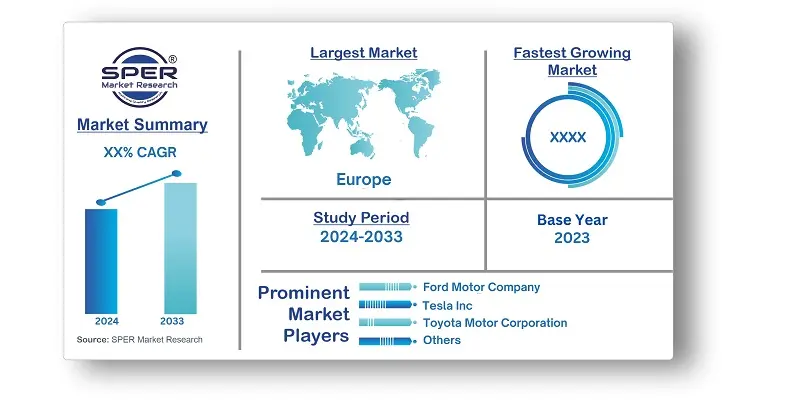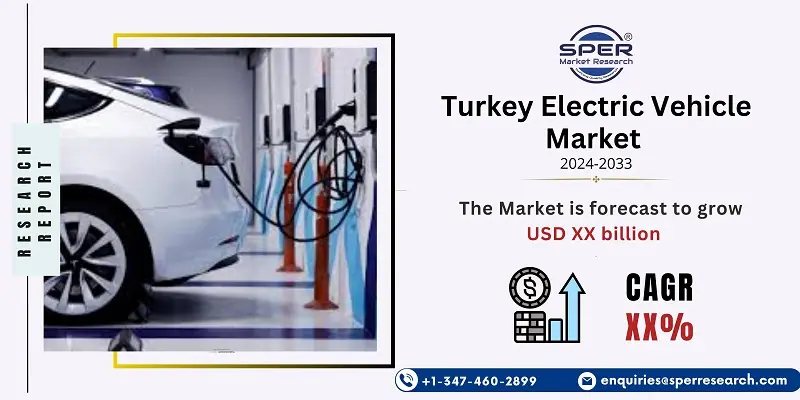
Turkey Electric Vehicle Market Growth, Size, Trends, Demand, Share, Revenue and Future Outlook
Turkey Electric Vehicle Market Size- By Vehicle Type, By Propulsion, By Range, By Battery Capacity- Regional Outlook, Competitive Strategies and Segment Forecast to 2033
| Published: Jun-2024 | Report ID: AMIN24138 | Pages: 1 - 103 | Formats*: |
| Category : Automotive & Transportation | |||
- In 2021, BYD introduced four new electric vehicle types made using Blade batteries in Chongqing. These new vehicle models, Tang EV and Song plus EV, Qin plus EV, and E2 2021, are available on the market and include improved battery safety features.
- Volkswagen, in collaboration with SAIC and FAW, will deliver the seven-seater EV ID.6 Crozz and ID.6 X in 2021. The vehicles are available in two battery versions (77 kWh and 58 kWh), as well as four powertrain combinations.


| Report Metric | Details |
| Market size available for years | 2020-2033 |
| Base year considered | 2023 |
| Forecast period | 2024-2033 |
| Segments covered | By Vehicle Type, By Propulsion, By Range, By Battery Capacity |
| Regions covered | Marmara, Central Anatolia, Mediterranean, Aegean, Southeastern Anatolia, Blacksea, Eastern Anatolia |
| Companies Covered | Turkey’s Automobile Joint Venture Group Inc, Ford Motor Company, Tesla Inc, Toyota Motor Corporation, Groupe Renault, Fiat Automobile S.p.A. |
- Businesses/Corporations
- Environmental Organizations
- Fleet Operators
- Government and Regulatory Bodies
- Individual Consumers
- Investors
- Public Transportation Agencies
- Research and Development Institutions
- Technology Providers
| By Vehicle Type: |
|
| By Propulsion: |
|
| By Range: |
|
| By Battery Capacity: |
|
- Turkey Electric Vehicle Market Size (FY’2024-FY’2033)
- Overview of Turkey Electric Vehicle Market
- Segmentation of Turkey Electric Vehicle Market By Vehicle Type (Two-Wheeler, Passenger Car, LCV, M&HCV)
- Segmentation of Turkey Electric Vehicle Market By Propulsion (BEV, PHEV, FCEV)
- Segmentation of Turkey Electric Vehicle Market By Range (0-50 Miles, 51-150 Miles, 151-200 Miles, 201-400 Miles, Above 400 Miles)
- Segmentation of Turkey Electric Vehicle Market By Battery Capacity (<50 kWh, 51-100 kWh, 101-200 kWh, 201-300 kWh, Above 300 kWh)
- Statistical Snap of Turkey Electric Vehicle Market
- Expansion Analysis of Turkey Electric Vehicle Market
- Problems and Obstacles in Turkey Electric Vehicle Market
- Competitive Landscape in the Turkey Electric Vehicle Market
- Impact of COVID-19 and Demonetization on Turkey Electric Vehicle Market
- Details on Current Investment in Turkey Electric Vehicle Market
- Competitive Analysis of Turkey Electric Vehicle Market
- Prominent Players in the Turkey Electric Vehicle Market
- SWOT Analysis of Turkey Electric Vehicle Market
- Turkey Electric Vehicle Market Future Outlook and Projections (FY’2024-FY’2033)
- Recommendations from Analyst
1.1. Scope of the report1.2. Market segment analysis
2.1. Research data source2.1.1. Secondary Data2.1.2. Primary Data2.1.3. SPER’s internal database2.1.4. Premium insight from KOL’s2.2. Market size estimation2.2.1. Top-down and Bottom-up approach2.3. Data triangulation
4.1. Driver, Restraint, Opportunity and Challenges analysis4.1.1. Drivers4.1.2. Restraints4.1.3. Opportunities4.1.4. Challenges4.2. COVID-19 Impacts of the Turkey Electric Vehicle Market.
5.1. SWOT Analysis5.1.1. Strengths5.1.2. Weaknesses5.1.3. Opportunities5.1.4. Threats5.2. PESTEL Analysis5.2.1. Political Landscape5.2.2. Economic Landscape5.2.3. Social Landscape5.2.4. Technological Landscape5.2.5. Environmental Landscape5.2.6. Legal Landscape5.3. PORTER’s Five Forces5.3.1. Bargaining power of suppliers5.3.2. Bargaining power of buyers5.3.3. Threat of Substitute5.3.4. Threat of new entrant5.3.5. Competitive rivalry5.4. Heat Map Analysis
6.1. Turkey Electric Vehicle Market Manufacturing Base Distribution, Sales Area, Product Type6.2. Mergers & Acquisitions, Partnerships, Product Launch, and Collaboration in Turkey Electric Vehicle Market
7.1. Turkey Electric Vehicle Market Size, Share and Forecast, By Vehicle Type, 2020-20267.2. Turkey Electric Vehicle Market Size, Share and Forecast, By Vehicle Type, 2027-20337.3. Two-Wheeler7.4. Passenger Car7.5. LCV7.6. M&HCV
8.1. Turkey Electric Vehicle Market Size, Share and Forecast, By Propulsion, 2020-20268.2. Turkey Electric Vehicle Market Size, Share and Forecast, By Propulsion, 2027-20338.3. BEV8.4. PHEV8.5. FCEV
9.1. Turkey Electric Vehicle Market Size, Share and Forecast, By Range, 2020-20269.2. Turkey Electric Vehicle Market Size, Share and Forecast, By Range, 2027-20339.3. 0-50 Miles9.4. 51-150 Miles9.5. 151-200 Miles9.6. 201-400 Miles9.7. Above 400 Miles
10.1. Turkey Electric Vehicle Market Size, Share and Forecast, By Battery Capacity, 2020-202610.2. Turkey Electric Vehicle Market Size, Share and Forecast, By Battery Capacity, 2027-203310.3. <50 kWh10.4. 51-100 kWh10.5. 101-200 kWh10.6. 201-300 kWh10.7. Above 300 kWh
11.1. Turkey Electric Vehicle Market Size and Market Share
12.1. Turkey Electric Vehicle Market Size and Market Share By Region (2020-2026)12.2. Turkey Electric Vehicle Market Size and Market Share By Region (2027-2033)12.3. Marmara12.4. Central Anatolia12.5. Mediterranean12.6. Aegean12.7. Southeastern Anatolia12.8. Blacksea12.9. Eastern Anatolia
13.1. Turkey’s Automobile Joint Venture Group Inc
13.1.1. Company details13.1.2. Financial outlook13.1.3. Product summary13.1.4. Recent developments13.2. Ford Motor Company13.2.1. Company details13.2.2. Financial outlook13.2.3. Product summary13.2.4. Recent developments13.3. Tesla Inc13.3.1. Company details13.3.2. Financial outlook13.3.3. Product summary13.3.4. Recent developments13.4. Toyota Motor Corporation13.4.1. Company details13.4.2. Financial outlook13.4.3. Product summary13.4.4. Recent developments13.5. Groupe Renault13.5.1. Company details13.5.2. Financial outlook13.5.3. Product summary13.5.4. Recent developments13.6. Fiat Automobile S.p.A.13.6.1. Company details13.6.2. Financial outlook13.6.3. Product summary13.6.4. Recent developments13.6.5. Recent developments13.7. OTHERS
SPER Market Research’s methodology uses great emphasis on primary research to ensure that the market intelligence insights are up to date, reliable and accurate. Primary interviews are done with players involved in each phase of a supply chain to analyze the market forecasting. The secondary research method is used to help you fully understand how the future markets and the spending patterns look likes.
The report is based on in-depth qualitative and quantitative analysis of the Product Market. The quantitative analysis involves the application of various projection and sampling techniques. The qualitative analysis involves primary interviews, surveys, and vendor briefings. The data gathered as a result of these processes are validated through experts opinion. Our research methodology entails an ideal mixture of primary and secondary initiatives.



Frequently Asked Questions About This Report
PLACE AN ORDER
Year End Discount
Sample Report
Pre-Purchase Inquiry
NEED CUSTOMIZATION?
Request CustomizationCALL OR EMAIL US
100% Secure Payment






Related Reports
Our Global Clients
Our data-driven insights have influenced the strategy of 200+ reputed companies across the globe.




















